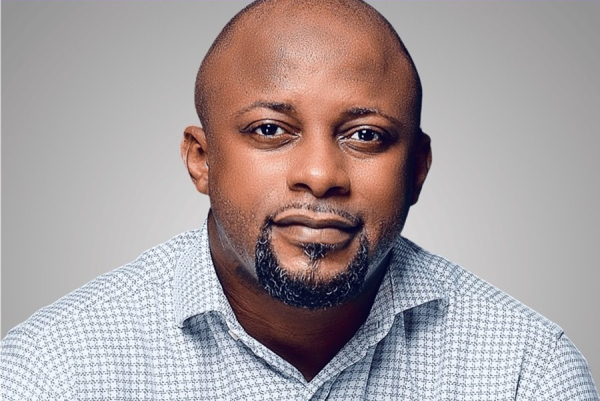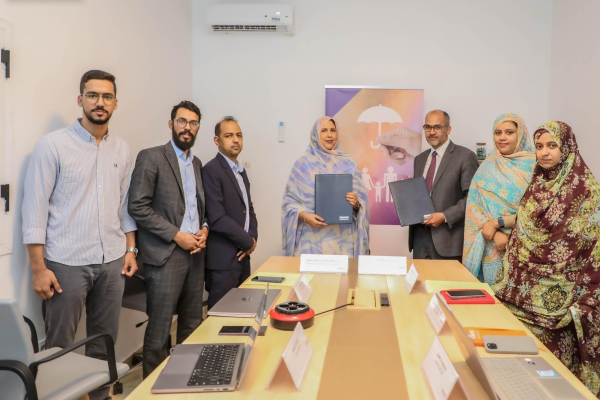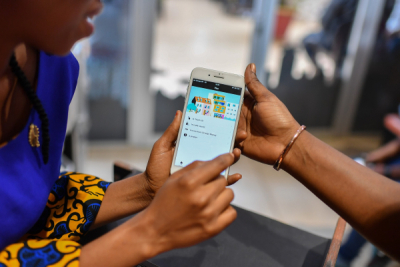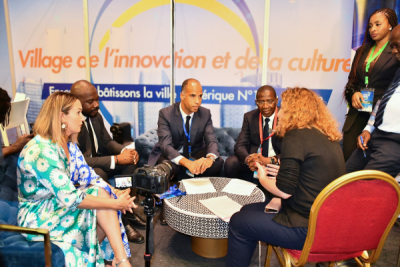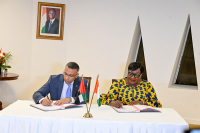Combining a passion for music and innovation with extensive production expertise, he is a dedicated contributor to the African music industry. Through Baziks, he actively structures and shapes the Congolese music landscape.
Baya Ciamala, a Congolese entrepreneur, radio host, and producer, is the founder and president of Baziks, a music streaming application dedicated to Congolese and African music.
Baziks, initially conceived as a brand and blog in 2016 and officially registered in 2019, swiftly evolved into a startup with a clear mission. Its goal is to provide independent artists with a platform to share and directly monetize their work, circumventing traditional music industry channels. The platform aims to empower African musicians and creators to distribute and sell their digital works directly to both local and international audiences.
Baziks offers a streaming solution entirely focused on Central African music, with particular emphasis on Congolese creativity. The platform seeks to boost the visibility of African music while protecting artists against piracy, leveraging locally developed technology. This model also aims to structure the music ecosystem in the Democratic Republic of Congo (DRC) by improving music access and ensuring fair compensation for creators.
The platform allows artists to manage their content, choose between streaming or direct downloads, and connect with their audience without intermediaries. This direct-to-fan model is built on the principle that artists should retain a significant share of the revenue generated by their work.
Each year, Baziks organizes the Baziks Digital Music Conference, an event that convenes industry experts, artists, producers, and institutional partners to strengthen ties within the music industry. In addition to this conference, the startup supports the local scene through concerts and cultural events. It also offers editorial content, crowdfunding campaigns, and digital ticketing services.
Baya Ciamala holds a degree in radio production, obtained in 2002 from the Congolese Institute of Audiovisual Media. He also earned a diploma in artistic management and project development in 2007 from the AMI Centre for the Development of Contemporary Music in France.
His professional career began in 1999 at Raga Media Sprl in Kinshasa, DRC, where he worked as a radio and TV host and producer. In 2006, he became head of the media’s radio department. From January 2011 to June 2025, he served as a public information assistant at the United Nations Mission in Congo.
Thanks to his startup Baziks, Baya Ciamala has received multiple accolades. He was the winner of the Digital Lab Africa Online Music Prize in 2016, the 1000 Entrepreneurs Prize at the Africa–France Summit in 2020, and the Orange Social Entrepreneur Award (POESAM) in DRC in 2021.
Melchior Koba
- The CNASS has partnered with the State Digital Agency to digitize the national health insurance system
- The agreement targets improved infrastructure, service quality, and digital inclusion for underserved populations
- It supports CNASS’s 2025–2030 strategy to expand coverage, enhance transparency, and better serve vulnerable groups
Mauritania's Caisse Nationale de Solidarité en Santé (CNASS), a voluntary health insurance scheme with a social mission, announced on Tuesday, July 15, the signing of a cooperation agreement with the State Digital Agency (AN-ETAT). This initiative marks the beginning of a partnership aimed at digitally transforming Mauritania's social protection system.
According to a CNASS press release, the agreement sets several concrete objectives. These include strengthening and securing CNASS's digital infrastructure, adopting modern solutions to improve service access and quality, and facilitating the sharing of technological expertise between the two institutions. The shared goal is to enhance digital inclusion, particularly for populations with limited exposure to digital tools.
This collaboration occurs amidst a broader national push to accelerate public service transformation. For CNASS, the agreement fully aligns with its upcoming 2025–2030 digitization strategy, which is currently under development. This strategy aims to improve service quality, enhance coordination with healthcare providers, ensure better tracking of benefits, and more effectively address the needs of vulnerable populations.
In Mauritania, CNASS plays a key role in the country’s social protection policy, particularly in expanding health coverage to informal sector workers. By partnering with AN-ETAT, the operational body responsible for implementing the national digital strategy, CNASS is taking a significant step toward more efficient, transparent, and interconnected management.
Ultimately, the partnership is expected to streamline services, improve data reliability, and strengthen transparency in health insurance administration. It also aims to enhance the user experience by facilitating remote access to benefits, while laying the foundation for a more inclusive, modern, and sustainable social protection system for all Mauritanians.
Samira Njoya
Ronny Kitio, a Cameroonian computer scientist, is using tech to shake up the African music industry. He created Colorfol, a digital platform that serves as a home for music, videos, and podcasts from Francophone Africa.
Kitio, who graduated in fundamental computer science from the University of Yaoundé 1, founded Colorfol in 2019. He launched it to respond to the specific needs of artists and fans in the region. The platform allows users to discover, stream, and legally buy African music, while giving independent artists visibility and fair income.
“Our goal is to create a user-friendly platform that responds to the specific needs of our markets in Francophone Africa,” Kitio said in 2024. “We want to encourage fans to buy music directly from the artists, thus offering instant monetization for them. We are committed to ensuring fair compensation by allocating 70% of revenues to the artists.”
Colorfol doesn’t stop at music. The platform also features video content, podcasts, and digital ticketing for concerts, showcases, and other cultural events. This positions Colorfol as a full-service hub for both fans and professionals in the African music ecosystem.
Before launching Colorfol, Kitio founded ColorTechnology in 2017, a tech company where he worked as CEO, analyst, and developer. He started his career in 2011 at EMEKA Distribution in Cameroon as a maintenance technician. In 2014, he joined Camtel as a network technician, then moved to Orca Cameroon in 2015 as IT manager.
Kitio’s innovation has earned international recognition. In 2019, he won a spot in the AYADALAB program organized by the French and Goethe Institutes. That same year, he was a finalist in the African Application Launchpad competition. In 2020, he won Best Francophone African Startup from the International Organisation of La Francophonie. In 2021, the French Institute awarded him the IFC Innovation Label.
This article was initially published in French by Melchior Koba
Edited in English by Ange Jason Quenum
-
Program recovered 43.5 tons of devices for repair, reuse, or recycling
-
28.5% of Orange's annual phone sales in the region were collected
-
Initiative supports affordable access to tech and reduces e-waste footprint
In 2024, Orange Middle East and Africa ramped up its circular economy efforts by collecting 284,000 used mobile phones, equal to 28.5% of its annual phone sales in the region. The data comes from the company’s 2024 Corporate Social Responsibility (CSR) Report, which outlines its push to reduce environmental impact while improving digital access.
Titled "Cultivating Impact", the report highlights the achievements of Orange’s “Re” program, which collected 43.5 tons of electronic waste for refurbishment or recycling.
The initiative was active in five countries, Côte d’Ivoire, Cameroon, Burkina Faso, Egypt, and Jordan, and is built on four pillars: collection, repair, refurbishment, and recycling. In West Africa, Orange partners with Ateliers du Bocage, a French social enterprise that specializes in managing used electronics. In Egypt and Jordan, the process is fully managed through the "Re" program.
Phones in working condition are restored and sold at lower prices. In Egypt, more than 10% of devices sold by Orange in 2024 were refurbished units. The program also operates in Senegal and Morocco, where demand for affordable refurbished devices is rising fast. Irreparable phones are dismantled, and components are processed through certified recycling channels following environmental standards.
The circular model also applies to internet boxes. In 2024, Orange collected 172,000 boxes, of which 115,000 were refurbished. This helped avoid 2,800 tons of CO₂ emissions, which Orange says equals the emissions from 150 car trips around the African continent.
Orange has also launched public awareness campaigns and expanded its network of collection points — especially in Côte d’Ivoire, Egypt, and Jordan — to encourage more returns. The goal is twofold: to cut down on electronic waste and make digital devices more affordable in a region where access remains below the global average.
According to the GSMA, a basic smartphone costs about 18% of monthly income in low- and middle-income countries, rising to 39% for the poorest 40%, and up to 51% for the bottom 20%.
Through these efforts, Orange aims to establish itself as a leader in circular economy practices within the telecom industry, combining innovation, environmental responsibility, and digital inclusion. The “Re” program, part of its core CSR strategy, is expected to expand to more of Orange’s subsidiaries in Africa and the Middle East in the coming years.
Ronald Chaula, a mobile development engineer from Dar es Salaam, Tanzania, is redefining digital payments across East Africa.
In 2023, Chaula launched PesaLock, a fintech startup designed to meet African business realities with secure and seamless payment and financial management solutions.
PesaLock builds tools that allow users to receive payments, track sales, generate real-time reports, and access key services such as inventory management and invoicing. By harnessing mobile and cloud technology, the platform reaches even areas with weak banking infrastructure. Security remains a priority; PesaLock integrates advanced authentication and data protections to address Africa’s growing cybersecurity needs.
The company’s platform connects buyers and sellers through a secure network, primarily targeting small and medium enterprises (SMEs), merchants, and entrepreneurs. PesaLock emphasizes ease of use, speed, and fraud prevention in a region where digital trust still poses major challenges.
Alongside his PesaLock duties, Chaula works as a developer at aSoft Ltd., a Tanzanian software publisher. He holds a computer science degree from the University of Dar es Salaam (2018) and earned a bachelor’s in IT management and programming in 2024.
Chaula gained early experience through internships in 2019 and 2020 in web design and mobile app development, respectively. Between 2023 and 2024, he managed programs and centers before fully committing to his tech venture.
PesaLock earned recognition in 2024 by winning the “Most Innovative and Creative Product” award at Starthub Africa’s Demo Day, highlighting its impact in Africa’s entrepreneurial ecosystem.
This article was initially published in French by Melchior Koba
Edited in English by Ange Jason Quenum
• Ivory Coast and French group Ynov Campus signed an agreement to open the first Ynov Campus in sub-Saharan Africa.
• A second deal with the Magic System Foundation will launch a Digital Academy to train youth in digital skills.
• These projects aim to create 40,000 jobs and attract $1.6 billion in investment by 2028.
Ivory Coast has taken two bold steps to tackle the digital skills gap and fuel its economic growth.
Authorities signed two major agreements to train local youth in tech and prepare the country for a digital future. The Village of Information Technologies and Biotechnology (VITIB), based in Grand-Bassam, signed a deal with French training powerhouse Ynov Campus.
This agreement will establish the first Ynov campus in sub-Saharan Africa. Ynov will offer hands-on training in digital fields like web development, data science, digital design, audiovisual production, cybersecurity, and artificial intelligence.
Officials sealed the deal during the inaugural Ivoire Tech Forum held in Abidjan from July 9 to July 11.
A second agreement between VITIB and the Magic System Foundation will launch the VITIB Digital Academy. This academy will boost local digital skills, help youth integrate into the job market, and improve employability in high-demand tech sectors.
Both projects form part of VITIB’s larger expansion strategy. The site already hosts 96 companies, five data centers, and a one-stop-shop for business setup. VITIB's 2023–2028 plan, budgeted at CFA180 billion ($320 million), seeks to transform Grand-Bassam into a fully integrated smart city.
VITIB wants to create 40,000 jobs and attract $1.6 billion in investment over the next three years.
As digital transformation accelerates, Ivory Coast is under pressure to build a tech-savvy workforce that meets international standards. The Ministry of Digital Transition plans to train thousands in cybersecurity, cloud computing, data management, advanced programming, and AI.
Authorities have made digital upskilling a national priority. They want to support startup growth, ensure digital sovereignty, and fully integrate into West Africa’s digital economy.
Samira Njoya
With a strong background in the tech industry, he now dedicates his expertise to supporting African startups. He works with innovators who are committed to transforming the continent's tech landscape and establishing a global presence.
Zakaria Sabti (photo), a Moroccan entrepreneur and tech executive, is the founder and CEO of Volund Ventures, a Dubai-based venture builder active across North Africa and the Middle East.
Since its founding in 2022, Volund Ventures has aimed to position Africa as a key player in exporting innovative technologies. It achieves this by supporting the creation, growth, and international expansion of high-impact startups. The firm operates as both a tech accelerator and a venture builder.
Volund Ventures focuses on developing startups with the potential for global success, emphasizing innovation, technology, and social impact. As a venture builder, it identifies market opportunities, conceives startup ideas, and then assembles the teams, resources, and funding needed to transform these ideas into viable businesses.
The firm offers tailored support covering areas such as software development, notably through no-code solutions, product strategy, digital marketing, financial structuring, and access to a network of investors and international partners. Its priority areas include artificial intelligence, digital content creation, digital transformation, and the export of African innovations to global markets.
Among the startups supported by Volund Ventures is TwinLink, which is also incubated by Orange Fab. TwinLink enables businesses to create smart digital versions of themselves that can communicate, listen, and assist users. TwinLink was selected for the 2025 edition of Viva Technology, a major event in the tech innovation sector held in June. The startup joined the AI Tech Trail, which showcases the most innovative companies in artificial intelligence.
Before founding Volund Ventures, Zakaria Sabti created Water Economic Technology (WET) in 2016, a startup focused on designing and manufacturing devices to help manage water consumption. He served as CEO of WET until 2017.
Zakaria Sabti holds a master’s degree in information technology, earned in 2017 from the National School of Applied Sciences in Marrakech, Morocco. He also obtained a PhD in business intelligence and big data in 2024 from Cadi Ayyad University.
In 2017, he began working at KBM Consulting, an IT firm, where he served as a business intelligence consultant. In 2018, he joined a Dubai-based recruitment company as a data and business transformation consultant before becoming its regional director in 2019.
From 2019 to 2023, Sabti was a partner at TechnomaX Systems, a Microsoft technology services company also based in Dubai. Concurrently, he served as Chief Technology Officer at Hemicube, a company specializing in extracting actionable insights from data.
Melchior Koba
-
Côte d’Ivoire signed two MoUs with UAE’s G42 Presight to support digital governance and strategy renewal
-
The deal comes as the current digital plan nears its 2025 end, after major infrastructure gains
-
Partnership aims to enhance AI use and public service efficiency, leveraging G42’s regional expertise
The Ivorian government has signed two non-binding memoranda of understanding with G42 Presight, an Emirati tech firm specializing in big data analytics and artificial intelligence. The agreements were signed on the sidelines of the inaugural Ivoire Tech Forum, held in Abidjan from July 9 to July 11.
One agreement establishes a collaborative framework for public administration reform and digitalization, signed with the Ministry of State in charge of Civil Service and Administrative Modernization. The second involves developing a national digital strategy, in partnership with the Ministry of Digital Transition and Digitalization.
This initiative comes as Côte d’Ivoire’s National Digital Development Strategy (SNDN) is set to expire this year. Launched five years ago, the SNDN aimed to strengthen digital inclusion, cybersecurity, and digital infrastructure development. Its achievements include deploying over 5,207 kilometers of fiber-optic cable, creating several online public service portals, and operationalizing the National Cybersecurity Agency.
In artificial intelligence, the country also adopted a dedicated data management strategy. This strategy aims to build a more efficient, accessible, and resilient administration capable of addressing the challenges of 21st-century digital governance.
While non-binding, these agreements lay the groundwork for stronger technological cooperation between Abidjan and Abu Dhabi. Through this partnership, Côte d’Ivoire seeks to leverage the expertise of G42 Presight, which has previously supported projects in Egypt and Rwanda in big data, AI, and smart governance. The goal is to improve the quality of public services, increase transparency in public action, and enhance state decision-making.
Samira Njoya
African governments push digital transformation to modernize healthcare. Computerized patient records (CPRs) emerge as a key tool in this effort. Although adoption remains uneven, countries make steady progress amid growing digital public services.
Consulting firm McKinsey & Company reported in 2023 that digital health tools including teleconsultations, CPRs, and chronic disease apps could reduce African health expenditures by up to 15%. This cost-saving potential, combined with the need to upgrade healthcare, drives government interest in CPRs. These systems now form the backbone of many national e-health strategies.
CPRs centralize and secure medical data. They improve patient follow-up, coordinate care, and reduce medical errors. By replacing paper records, which often cause information loss and delays, CPRs address urgent modernization needs.
Beyond care quality, CPRs supply health authorities with real-time data. This data helps anticipate, monitor, and manage epidemics. It also supports public health policy decisions.
Pilot Projects Underway in Several Countries
Several countries run pilot CPR projects. Côte d’Ivoire’s health facilities with CPRs generated over CFA1.25 billion ($2.2 million) in tracked medical revenue in 2024, according to the Directorate of IT and Digital Health. More than 268 facilities connect to the Hospital Information System (HIS) and CPR.
Senegal, Rwanda, Ghana, and Kenya have launched similar systems. Nigeria currently tests interoperability between CPRs and its national health insurance database.
A Rapidly Growing Global Market
The global electronic medical records market grows rapidly. Market intelligence firm Mordor Intelligence projects it will reach $42.1 billion by 2029, up from $32.8 billion in 2024, with a 5.11% annual growth rate. The Covid-19 pandemic accelerated this trend by highlighting the need for fast, reliable, and secure clinical data access.
Technological advances, political will, and wider accessibility drive this growth—even in low- and middle-income countries.
Persistent Challenges to Overcome
Despite potential, Africa faces major hurdles. Limited internet access, especially in rural areas, remains a top barrier. The International Telecommunication Union reported only 38% of Africans had internet access in 2024. Training healthcare workers in digital skills also lags. Without it, CPR reliability and adoption suffer. Data protection poses another challenge. Only 40 African countries have personal data protection laws, and cybersecurity remains weak. Patient and professional trust depends on securing medical information.
Towards Pan-African Governance of Digital Health
Experts call for pan-African coordination to overcome these challenges. Harmonizing standards, ensuring system interoperability, and setting common data security rules would create a strong foundation for sustainable e-health.
Widespread CPR adoption could transform African healthcare—if governments invest in digital infrastructure, train professionals, and protect data. CPRs must become more than technology tools; they should form the backbone of modern, resilient, and inclusive public health policies.
This article was initially published in French by Samira Njoya
Edited in English by Ange Jason Quenum
Ivorian tech entrepreneur and engineer Cedric Ceruya Oka Baidai is building digital solutions to make e-commerce easier and safer for users and businesses in Côte d’Ivoire and across West Africa.
Cedric Ceruya Oka Baidai leads Aynid, a startup he founded in 2024. The company develops integrated tools that support buying and selling online—addressing local market needs with customized digital services.
The startup has launched several core services. Aynid Search is a vertical search engine designed for e-commerce. It allows users to find specific products or services in seconds.
Next is Aynid Shop, a smart marketplace. It includes automated store management, marketing tools, a sales tracking dashboard, and an instant messaging system. Sellers can manage offers, track sales, and handle payments through one streamlined interface.
Aynid is expanding its portfolio. Soon, it will launch Aynid Pay, a payment gateway to handle collections and withdrawals. The company also plans to roll out Aynid Delivery, a logistics service that uses QR code tracking and affordable pricing.
Aynid showcased its platform at Viva Technology, a major startup and innovation event held on June 14–15.
Before launching Aynid, Cedric Ceruya Oka Baidai co-founded Fermentuse, a web development agency, in 2012. He served as technical director there until 2020.
Cedric Ceruya Oka Baidai holds a diploma in electronics from the Félix Houphouët-Boigny National Polytechnic Institute (2010) and a telecommunications engineering degree from HETEC in Abidjan (2013).
He became a software engineer in 2015 at Raven’s Digital Team. A year later, he joined VEONE as a programmer analyst. He now heads the company's research and innovation department.
This article was initially published in French by Melchior Koba
Edited in English by Ange Jason Quenum
More...
Benue State’s push to create jobs through digital transformation comes at a critical time for both Nigeria and Africa as a whole.
The Benue State Government is actively seeking collaborations with regional and international organizations to create jobs for its citizens, with a strong focus on opportunities in the digital space.
Speaking at the 3rd African Job Creation Forum held at the Adwa Victory Memorial Museum in Addis Ababa, Ethiopia from 7-9 July 2025, the Managing Director of Benue Digital Infrastructure Company (BDIC), Mr. Terwase Gbande — representing the state government — emphasized Benue’s commitment to building a resilient digital economy that empowers youth, creates sustainable jobs, and enhances governance.
Organized by the African Union, the Government of Ethiopia, and the African Continental Free Trade Agreement (AfCFTA) Secretariat, the forum brings together pan-African stakeholders committed to accelerating job creation through digital transformation, trade integration, and infrastructure development across the continent.
The forum’s focus strongly supports BDIC’s mission to build a robust digital economy that drives sustainable job creation, empowers young people, and strengthens governance. Discussions emphasized a key takeaway: Africa’s progress depends on shared digital infrastructure, inclusive innovation, and open, borderless opportunities.
For Benue, this translates to fast-tracking broadband rollout, developing e-governance systems, implementing smart agriculture technologies, and broadening digital skills training. According to a joint report by the World Bank and the IFC, by 2030, 35–45% of all jobs in Nigeria will require some level of digital skills. Notably, most of this demand will come from roles outside traditional ICT fields, as businesses increasingly adopt digital technologies, underscoring the urgent need for broad-based digital training initiatives like those being pursued in Benue State.
Hikmatu Bilali
He develops projects that let him explore how technology affects daily life. He leverages his technical skills to modernize the agricultural sector.
Thioube Samba (photo), a Senegalese computer engineer and entrepreneur, founded and is CEO of Sotilma. His company designs technology solutions for the agricultural sector.
Established in 2022, Sotilma develops tools to boost farming efficiency. The company provides automated water management systems that allow remote control of irrigation and fluid distribution. These systems operate without internet or electricity by utilizing long-range communication and solar power.
Sotilma's main solution, Sotilma Farm, uses smart valves and connected water meters controlled via a mobile or web application. Users can monitor real-time data on soil moisture, water levels, and other environmental factors.
The system allows remote irrigation adjustments, which helps reduce water consumption and increase crop yields. Farmers can also automate key operations, from irrigation to crop monitoring, through an easy-to-use interface.
Beyond agriculture, Sotilma also offers tools for industrial pipeline management, water treatment, and fluid distribution across various sectors. Orange Startup Studio supports the company. Sotilma was among the Orange-backed startups representing Senegal in June at Viva Technology 2025, an international tech and startup event hosted by telecom operator Orange. Sotilma also received the "Social Impact" award from Yas Sénégal during its Innovation Challenge.
Thioube Samba earned a degree in computer engineering from the Polytechnic Institute of Saint-Louis in 2022. He began his career in 2021 as a data science intern at the African Centre of Excellence in Mathematics, Computer Science, and ICT in Senegal. In 2022, he joined Sonatel, the country’s main telecom operator, as a data science intern. By 2023, he was appointed regional delegate for the GRFI Filaha Innove Incubator in the ECOWAS region.
Melchior Koba
-
Tunisia used AI to draft its 2026–2030 development plan
-
Plan prioritizes digital reform, healthcare, and energy
-
Goal is data-driven, transparent governance
Tunisia's Development Planning Commission used artificial intelligence (AI) to draft the nation's 2026–2030 national development plan, Commission President Mohamed El Kou announced on Wednesday, July 9. The plan outlines Tunisia's economic and social priorities for the next five years.
According to El Kou AI tools analyzed extensive sector-specific indicators to objectively identify key strategic priorities. The plan prioritizes digital transformation, legislative reform, support for small and medium-sized enterprises, regional equity, healthcare, and renewable energy. This approach, he noted, aims to base decisions on genuine needs rather than arbitrary political choices.
"Using artificial intelligence in planning is now a necessity. Those who fail to adapt risk marginalization," El Kou said. He added, "In a rapidly changing world, Tunisia cannot lag behind. It must seriously embrace the digital shift and fully commit to it." He clarified that AI complements human intelligence within a vision for an "intelligent state," rather than replacing it.
This initiative reflects a drive to modernize public policy, enhance transparency, and prepare Tunisia’s economy for global digital competition. It comes as AI remains a central topic of global debate. The World Bank suggests that AI, when combined with human-led management and decision-making, can assist governments in addressing development challenges.
The institution noted that disruptive technologies such as artificial intelligence (AI) have the potential to transform governments. It added that AI can be used as a tool to deliver personalized service experiences, improve the efficiency of management processes, strengthen policy compliance, and help detect fraud.
Adoni Conrad Quenum
Flutterwave, Africa’s payments technology company, has secured a Payment Institution license from the Central Bank of West African States (BCEAO), officially allowing it to operate in Senegal, it announced July 10.
This license enables Flutterwave to offer its full suite of secure, seamless payment solutions to businesses in Senegal and to those expanding into Francophone Africa.
This expansion allows businesses to offer popular local payment methods, process payouts easily, and access robust APIs and no-code tools like payment links and invoices.


